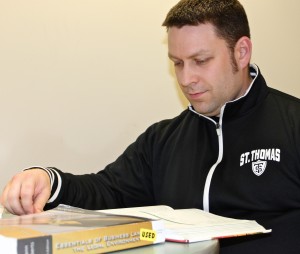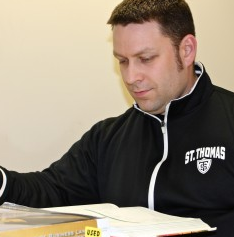Within the last five years, the number of veterans attending St. Thomas has doubled, according to Registrar Office records coordinator Chiara Babcock.
Gunners’ Mate Second Class Timothy Potter, a senior at St. Thomas, said the Post-9/11 GI Bill contributed to this increase. The bill, enacted on June 30, 2008, provides financial assistance for veterans. Qualifications for the Post-9/11 GI Bill are a minimum of 90-day active duty time, and honorable discharge after Sept. 10, 2001.
“(The Post-9/11 GI Bill) has really made it accessible for veterans to go back to school without having to worry about financial aid,” Potter said. “Ultimately, going to school allows us to become a part of an educated workforce.”

The coverage veterans receive is dependent on how long they have served the military. To qualify for the full benefit of approximately $18, 077.50, veterans must have served a minimum of three years.
According to the U.S. Department of Veterans Affairs, the Yellow Ribbon Program allows students to bridge the gap of private school tuition after Post-9/11 GI Bill benefits.
The St. Thomas Veteran Resources page indicates a total of 173 students at the university are receiving veteran educational benefits as of fall 2012.
These benefits are not limited to veterans only, but they also include family members.
“The Department of Defense allowed veterans to transfer their benefits to either a spouse or a dependent child,” Babcock said. “This is because a lot of older service members who qualify for the Post-9/11 GI Bill already had bachelor’s and master’s degrees.”
Babcock, who reports enrollment to the Veterans Affairs, said St. Thomas has a number of family members who are using the transferred benefits.
While tuition costs may not be a concern to veterans, the challenge of adjusting to life as a civilian could be.
“In the military, you don’t have to worry about shelter, food, or healthcare,” Potter said. “But coming out of that, you now have to provide for yourself. Therefore, financial budgeting is probably one of the second biggest things I believe veterans face coming out of service.”
Sergeant Gunnar Ruud, a junior at St. Thomas, said no longer having a strictly routinized lifestyle has also been an adjustment.
“There is a lot of structure in the military, whereas as a student, you have to be at class but you are given the freedom to do whatever you want, whenever,” Ruud said. “Getting used to that has been somewhat of a challenge.”
A veterans in college research study discovered around 25 percent of veterans experienced severe depression, one-third suffered from severe anxiety and 45 percent had symptoms of Post-Traumatic Stress Disorder (PSTD).
Although Ruud and Potter said they have not experienced these symptoms themselves, they know veterans who have.
“I’ve seen other people suffer from that to varying degrees, and it’s definitely a problem,” Ruud said. “I’ve had some symptoms of that, but I wouldn’t say I’ve had something as severe or traumatic as PTSD.”
Potter said there is a difference between serious illnesses and simply coming out of the military.
“While PSTD is very real, I tend to think there is a difference between that and just coming out of the military,” Potter said.
The memories they carry from service still play an active role in their everyday lives.
“I would say I’m reminiscent, but depending on the day, those memories can be good or bad,” Potter said.
One of the difficulties of completing active duty was parting ways with a close-knit brotherhood while serving, Ruud said.
Potter said bonds continue even after service.
“Most of my good group of friends have all served,” Potter said. “There is definitely that common bond, which usually brings us closer than we are to other people (on campus).”
Ruud and Potter said the military has provided them with the ability to handle the work commitments expected of a college student.
“Coming from a military background, I know how to stay focused on projects, have the discipline to get things done and know the purpose of being in school,” Ruud said. “Also, not being afraid to take on challenges and handle situations that would otherwise be considered stressful.”
Potter has a similar outlook on what students may perceive as “stress.”
“No one is dying, nobody is shooting at me or nobody’s life is going to end as a result of a messed up paper. This is not the end of the world,” Potter said. “This is solvable. This is correctable, as oppose to my other profession.”
Potter added, military discipline has benefitted him and his friends.
“In my experience, most of the veterans I know are over-achievers, and it goes back to that discipline, you know what it takes to succeed,” Potter said. “You are also not in your early 20’s anymore, so compared to other students, you already have got that partying out of your system, and can remain focused.”
While Potter said the military influences one’s character forever, Ruud said there is more to veterans than their past.
“I think a lot of veterans are not ashamed or want to avoid it, but they realize serving was a certain part of their lives. They are ready to move on,” Ruud said. “They’re ready to turn a new page. This is their college phase.”
Babcock agreed that veterans shouldn’t be viewed differently from other students on campus.
“People, not veterans or students; that’s how I always try to see them,” Babcock said.
Eden Checkol can be reached at chec7168@stthomas.edu.

